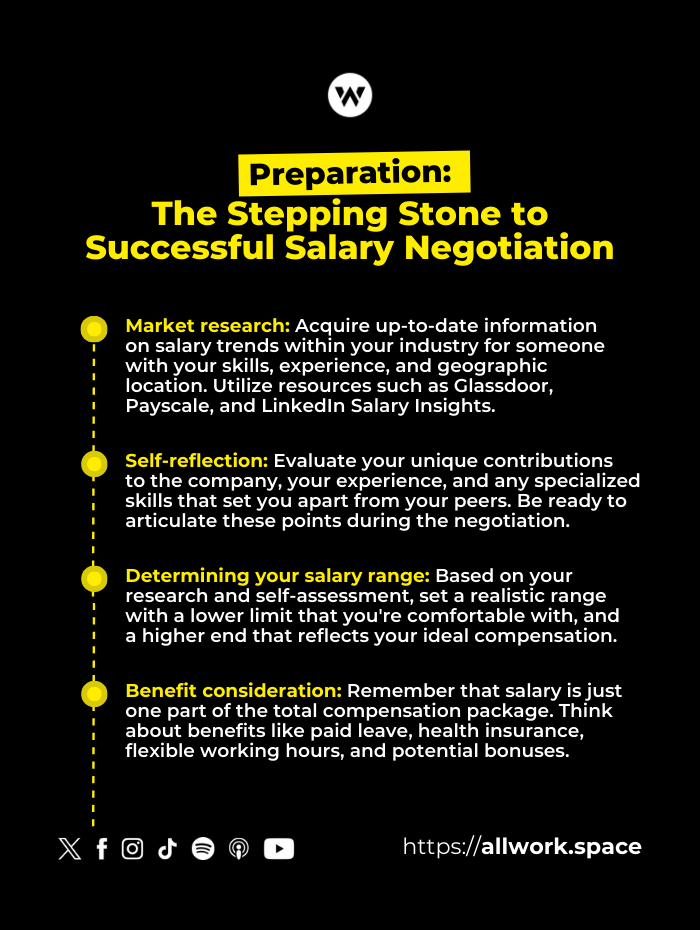- Salary negotiation is an essential skill that can lead to better compensation and job satisfaction, but it requires market research, self-assessment, and a strategic approach to discussion.
- Successful negotiation involves compromise without underselling one’s worth and maintaining a cordial relationship with the employer, emphasizing the importance of being prepared and knowledgeable about the market value and company context.
- Avoid common negotiation pitfalls such as accepting the first offer, failing to prepare, overvaluing salary over benefits, aggressive tactics, and not having alternative options.
In today’s competitive job market, having sharp negotiation skills is essential to ensure that you are paid what you’re worth.
Salary negotiation can be a delicate process, but by understanding the art of negotiation, preparing properly, and executing your strategy with confidence, you can significantly enhance your income and job satisfaction.
Negotiating works. In fact, 66% of U.S. workers who tried to negotiate their starting salaries got what they were asking for.
Job seekers: Ensure you’re caught up on these key techniques and considerations of salary negotiation, including optimal ways to draft a salary negotiation email, and how to navigate the complexities of this vital career interaction.
This will ensure you walk away from the table with a compensation package that reflects your value.
Understanding Salary Negotiation and Its Importance
Negotiation offers an opportunity to align the expectations of both parties while highlighting an employee’s skills, experience, and potential.
Salary negotiation is the process in which an employee and employer discuss and agree upon the terms of compensation. The ability to negotiate successfully is a crucial aspect of career advancement. Negotiation offers an opportunity to align the expectations of both parties while highlighting an employee’s skills, experience, and potential.
What Typically Happens When You Compromise During a Negotiation?
When compromising during salary negotiation, it often means that there is a give and take from both the employer and the employee. Compromise could lead to a salary that falls between what the employer initially offered and what the employee requested.
While this can be seen as a successful negotiation—achieving a middle ground—it might also mean settling for less than the desired amount or accepting certain benefits in lieu of direct compensation.
The key is to compromise without underselling your worth while maintaining a positive relationship with your employer.
Preparation: The Stepping Stone to Successful Salary Negotiation

Based on your research and self-assessment, set a realistic range with a lower limit that you’re comfortable with, and a higher end that reflects your ideal compensation.
Before entering salary negotiation, preparation is paramount. Understand your needs, research the market, and internally audit your accomplishments and skill set to arrive at a realistic figure you aim to achieve. Preparation involves:
- Market research: Acquire up-to-date information on salary trends within your industry for someone with your skills, experience, and geographic location. Utilize resources such as Glassdoor, Payscale, and LinkedIn Salary Insights.
- Self-reflection: Evaluate your unique contributions to the company, your experience, and any specialized skills that set you apart from your peers. Be ready to articulate these points during the negotiation.
- Determining your salary range: Based on your research and self-assessment, set a realistic range with a lower limit that you’re comfortable with, and a higher end that reflects your ideal compensation.
- Benefit consideration: Remember that salary is just one part of the total compensation package. Think about benefits like paid leave, health insurance, flexible working hours, and potential bonuses.
How to Write a Salary Negotiation Email
A well-crafted salary negotiation email is a powerful tool to open a dialogue with your employer about your compensation. Here’s a step-by-step guide to drafting an effective salary negotiation email:
1. Subject Line: Keep it professional and clear, for example, “Meeting Request: Discussion regarding my compensation package.”
2. Greetings: Address your manager respectfully and by name.
3. Appreciation: Express your gratitude for the current offer or position.
4. Value Proposition: Briefly outline your value to the company, mentioning specific achievements or contributions.
5. Salary Discussion: Introduce the fact that you’ve done market research and would like to discuss your compensation package.
6. Suggest a Meeting: Propose a face-to-face or virtual meeting to discuss further, indicating your flexibility in scheduling.
7. Sign-off: Thank them for considering your request and end with a professional sign-off.
Key Steps to Get Ready for a Salary Negotiation Discussion
Thorough preparation can make the difference between a successful salary negotiation and a missed opportunity. Here are key steps to prepare effectively:
1. Define Your Worth: Be aware of your achievements, skillset, and how they translate into added value for the employer.
2. Salary Benchmarking: Use industry-specific data to understand the standard compensation for your role and experience. Be prepared to present it concisely.
3. Understand Company Context: Learn about the company’s pay philosophy, financial status, and compensation policies.
4. Role-Play: Practice your negotiation pitch with someone who can provide constructive feedback.
5. Document Your Case: Prepare a list of talking points highlighting why you deserve a higher salary, including quantifiable achievements.
Researching and Determining Your Market Value
Determining your market value before a salary negotiation may seem daunting, but it is crucial. It equips you with the necessary data to support your request for higher pay. To determine your market value:
1. Use Salary Tools: Platforms like the Bureau of Labor Statistics, Glassdoor, and Salary.com provide salary information that can help set a baseline.
2. Network Insights: Talk to mentors, colleagues, and industry contacts to gather anecdotal information about salary standards.
3. Professional Organizations: Industry trade groups often conduct regular salary surveys that can be used as reliable benchmarks.
4. Consider Location: Adjust your salary expectations based on the cost of living and pay scales in your geographic area.
Common Mistakes to Avoid When Negotiating Salary
Negotiating salary is fraught with potential missteps, but awareness of these can steer you away from common pitfalls:
- Accepting the First Offer: Jumping at the first offer may result in a lower salary than you could have obtained with negotiation.
- Lack of Preparedness: Failure to research and present a compelling case for your desired salary can undermine your negotiation.
- Overvaluing Salary: Overemphasis on salary without considering the entire compensation package, including benefits, can be short-sighted.
- Being Too Aggressive: A confrontational or aggressive tone can damage your relationship with your employer and undermine your negotiation.
- Not Having Alternatives: Without a backup plan or alternative offers, you may come off as desperate or inflexible, weakening your position.
By building your negotiation skills, crafting an effective salary negotiation email, adhering to salary negotiation tips, and drawing on negotiation best practices, you can learn how to negotiate a higher salary with confidence.
Salary negotiation is an intricate dance, requiring self-awareness, preparation, and strategic communication. By building your negotiation skills, crafting an effective salary negotiation email, adhering to salary negotiation tips, and drawing on negotiation best practices, you can learn how to negotiate a higher salary with confidence.
Remember to approach the negotiation as a discussion leading to an agreement beneficial for both sides. Through careful research and preparation, potential compromise, and avoidance of common mistakes, you can secure a salary that truly reflects your market value and professional worth.


 Dr. Gleb Tsipursky – The Office Whisperer
Dr. Gleb Tsipursky – The Office Whisperer Nirit Cohen – WorkFutures
Nirit Cohen – WorkFutures Angela Howard – Culture Expert
Angela Howard – Culture Expert Drew Jones – Design & Innovation
Drew Jones – Design & Innovation Jonathan Price – CRE & Flex Expert
Jonathan Price – CRE & Flex Expert














